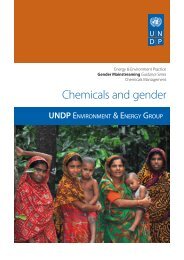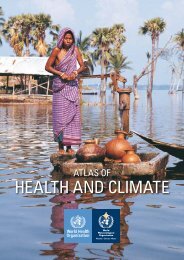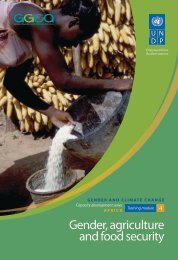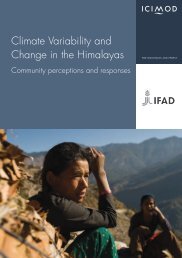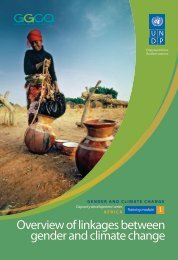jotoafrika - Gender Climate
jotoafrika - Gender Climate
jotoafrika - Gender Climate
Create successful ePaper yourself
Turn your PDF publications into a flip-book with our unique Google optimized e-Paper software.
Women from the Gbénondou group undertake training on the selection of<br />
certified seeds in Davié Tékpo, southern Togo © AFHON 2009<br />
Women have been absent from debates<br />
on climate change for a long time,<br />
because men did not ask for or consider<br />
their views. However, women can and do<br />
contribute to innovative solutions to the<br />
problems caused by climate change.<br />
One example is the Gbénondou (meaning<br />
‘one voice’) group in Togo, composed<br />
of both women and men. To provide<br />
information about climate risks and to seek<br />
possible adaptation options, the Actions<br />
en Faveur de l’Homme et de la Nature<br />
(AFHON) association undertook a pilot<br />
project to support the Gbénondou group.<br />
The project aims to help members to<br />
develop reliable agricultural techniques to<br />
deal with the challenges caused by climate<br />
change. Women are particularly targeted<br />
by the project, because they have until<br />
now always been left out during training<br />
programmes.<br />
Challenges<br />
The women in the group farm in Davié Tékpo<br />
village in southern Togo. They acquired the<br />
land through leasing, since they do not own<br />
land. In addition to the common problems of<br />
farming in poor areas (such as low technical<br />
capacity, little equipment, and difficulties with<br />
land availability and access), critical weather<br />
variability has had major effects on the local<br />
community.<br />
A major issue is the irregularity of rainfall.<br />
This contributes to the degradation and<br />
loss of farmland, and soil erosion increases<br />
during periods of intense rainfall. Other<br />
climate-related problems include<br />
increased exposure of crops to pests<br />
and diseases and a decline in the<br />
resilience of seeds to extreme weather.<br />
Women are actively involved in<br />
agriculture in the village, which is their<br />
only source of income. Men are generally<br />
tradesmen involved in carpentry, public<br />
service, transport and masonry. Women<br />
sell products from the fields, so if climate<br />
change affects their crops, their business<br />
is also affected. Thus, women are more<br />
vulnerable to climate vulnerability.<br />
Women adapt<br />
in southern<br />
Togo<br />
Case study<br />
Field schools<br />
An AFHON technical team, with the support<br />
of Institut de Conseil et d’Appui Technique,<br />
a national institute specialised in providing<br />
advice and technical support in agronomy,<br />
organised field schools and demonstration<br />
units. Women were trained in the<br />
production and provision of certified seeds<br />
and taught about agricultural diversification<br />
options, such as breeding animals. These<br />
have had many successful outcomes, all of<br />
which have improved the living standards<br />
of group members.<br />
After attending the field schools, most<br />
women agreed to adopt new innovative<br />
techniques.<br />
Each family has increased its cropland<br />
area by 2 or 3 hectares.<br />
Output per unit of land has improved<br />
from 1.5 to 3.5 tons per hectare.<br />
The success of this initiative demonstrates<br />
how women are important and must<br />
be included in the solutions to climate<br />
change. The project also highlights several<br />
adaptation measures that other farming<br />
groups in the region could adopt:<br />
rotate crops to effectively fight against<br />
crop pests and the degradation of arable<br />
land<br />
adapt planting seasons and crops to<br />
rainfall patterns by establishing strong<br />
hedgerows and windbreaks; this<br />
protects farmland against<br />
water erosion in heavy rains and also<br />
wind erosion<br />
introduce species such as Leucena<br />
lococephala, Samanea samane,<br />
Mucouna and Caezalpinia pulcherima;<br />
these capture atmospheric nitrogen and<br />
convert it into a form of nitrogen that<br />
other crops can take up.<br />
Kokou Mawunya Guidigan<br />
Actions en faveur de l’Homme et de la<br />
Nature (AFHON), 08 BP 81 555, Lomé,<br />
Togo<br />
Tel + 228 9298528<br />
afhon.coordination@gmail.com<br />
Sandra Akpene Freitas<br />
Global advocacy associate<br />
Women's Environment & Development<br />
Organization (WEDO)<br />
Tel +212 9730325<br />
cendrillon_a@yahoo.fr<br />
See also<br />
Q&A: "Incomprehensible" Absence of<br />
Women in Global Environment Policy,<br />
Terraviva Online, 2010<br />
http://bit.ly/fSMRTN<br />
Gbénondou group pilot project<br />
http://bit.ly/hKC63J<br />
Join the Joto Afrika<br />
debate online<br />
Joto Afrika Eldis Community Group:<br />
http://bit.ly/bM3ESo<br />
Joto Afrika Facebook Group:<br />
http://bit.ly/aMNLth<br />
Page 3



